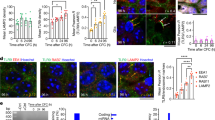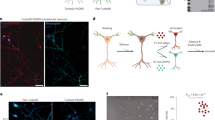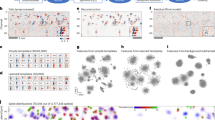Abstract
SYNAPTIC transmission in the hippocampus is rather unreliable, with many presynaptic action potentials failing to release neurotransmitter1–4. How is this unreliability affected by the alterations in synaptic strength seen in long-term potentiation (LTP)5 and long-term depression6,7 (LTD)? We find that LTP increases synaptic reliability, and LTD decreases it, both without a change in the size of those postsynaptic currents that do occur. Thus LTD is a functional inverse of LTP.
This is a preview of subscription content, access via your institution
Access options
Subscribe to this journal
Receive 51 print issues and online access
$199.00 per year
only $3.90 per issue
Buy this article
- Purchase on Springer Link
- Instant access to full article PDF
Prices may be subject to local taxes which are calculated during checkout
Similar content being viewed by others
References
Raastad, M., Storm, J. F. & Andersen, P. Eur. J. Neurosci. 4, 113–117 (1992).
Rosenmund, C., Clements, J. D. & Westbrook, G. L. Science 262, 754–757 (1993).
Hessler, N. A., Shirker, A. M. & Malinow, R. Nature 366, 569–572 (1993).
Allen, C. & Stevens, C. F. Proc. natn. Acad. Sci. U.S.A. (in the press).
Bliss, T. V. P. & Collingridge, G. L. Nature 361, 31–39 (1993).
Dudek, S. M. & Bear, M. F. Proc. natn. Acad. Sci. U.S.A. 89, 4363–4367 (1992).
Mulkey, R. M. & Malenka, R. C. Neuron 9, 967–975 (1992).
Edwards, F. A., Konnerth, A., Sakmann, B. & Takahashi, T. Pflügers Arch. Ges. Physiol. 414, 600–612 (1989).
Blanton, M. G., Lo Turco, J. J. & Kriegstein, A. R. J. Neurosci. 30, 203–210 (1989).
Malinow, R. & Tsien, R. W. Nature 346, 177–180 (1990).
Wigström, H., Gustafsson, B., Huang, Y.-Y. & Abraham, W. C. Acta Physiol. Scand. 126, 317–319 (1986).
Collingridge, G. L., Kehl, S. J. & McLennan, H. J. Physiol., Lond. 334, 33–46 (1983).
Malinow, R. & Miller, J. P. Nature 320, 529–530 (1986).
Kelso, S. R., Ganong, A. H. & Brown, T. H. Proc. natn. Acad. Sci. U.S.A. 83, 5326–5330 (1986).
Korn, S. J., Marty, A., Connor, J. A. & Horn, R. Meth. Neurosci. 4, 364–372 (1991).
Stevens, C. F. & Wang, Y. Nature 364, 147–149 (1993).
Silva, A. J., Stevens, C. F., Tonegawa, S. & Wang, Y. Science 257, 201–206 (1992).
Manabe, T., Renner, P., & Nicoll, R. A. Nature 355, 50–55 (1992).
Author information
Authors and Affiliations
Rights and permissions
About this article
Cite this article
Stevens, C., Wang, Y. Changes in reliability of synaptic function as a mechanism for plasticity. Nature 371, 704–707 (1994). https://doi.org/10.1038/371704a0
Received:
Accepted:
Issue Date:
DOI: https://doi.org/10.1038/371704a0
This article is cited by
-
Presynaptic endoplasmic reticulum regulates short-term plasticity in hippocampal synapses
Communications Biology (2021)
-
Observation of Distressed Conspecific as a Model of Emotional Trauma Generates Silent Synapses in the Prefrontal-Amygdala Pathway and Enhances Fear Learning, but Ketamine Abolishes those Effects
Neuropsychopharmacology (2015)
-
Synapse elimination and learning rules co-regulated by MHC class I H2-Db
Nature (2014)
-
Specific evidence of low-dimensional continuous attractor dynamics in grid cells
Nature Neuroscience (2013)
-
Altered Learning and Arc-Regulated Consolidation of Learning in Striatum by Methamphetamine-Induced Neurotoxicity
Neuropsychopharmacology (2012)
Comments
By submitting a comment you agree to abide by our Terms and Community Guidelines. If you find something abusive or that does not comply with our terms or guidelines please flag it as inappropriate.



